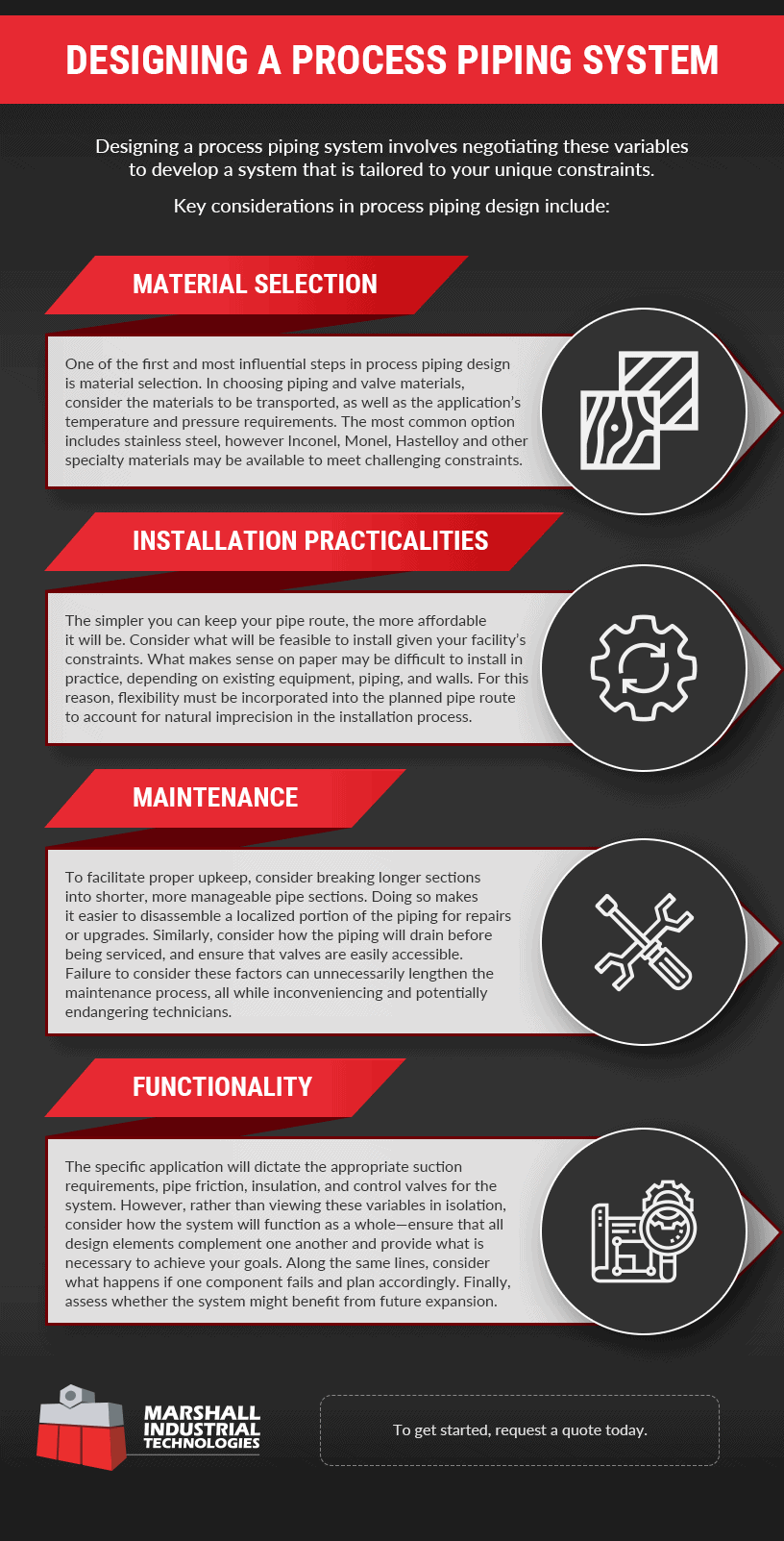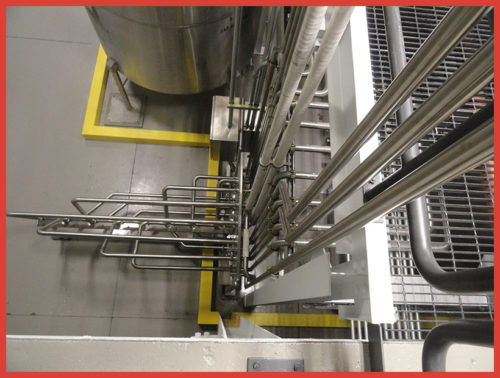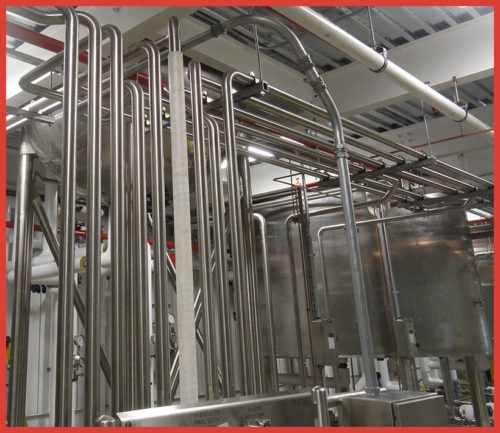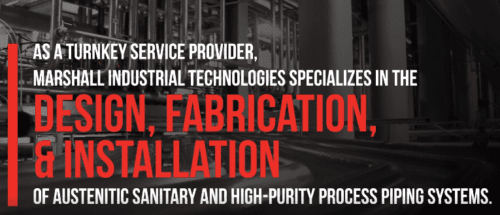Industrial facilities of all kinds rely on process piping to move fluid, gas, and fine particulate matter. Process piping refers to the interconnected system of pipes or tubes that transport materials within and throughout a facility. Process piping systems may be simple and limited in scope, or they may be extensive and intricate, depending on the application. As such, it’s important to work with an experienced process piping supplier who can negotiate the many variables involved in process piping design.
As a turnkey service provider, Marshall Industrial Technologies specializes in the design, fabrication, and installation of austenitic sanitary and high-purity process piping systems. We support clients from design through installation to provide personalized, high-performance process piping across diverse industries and applications.
 Our Process Piping Services
Our Process Piping Services
Marshall Industrial Technologies is your single source for process piping installation, modification, maintenance and repair. As a turnkey manufacturer of process piping, we handle all aspects of our clients’ projects from design through inspection and commissioning. Once we’ve developed an approved design, we draw on orbital and/or manual TIG processes to craft durable, high-performance piping systems tailored to each client’s unique needs, with both shop and on-site fabrication available as required.
Our extensive range of process piping services includes the following:
Complete Piping System Fabrication and Installation
- Orbital and Manual TIG Welding typically using Stainless Steel, Inconel, Monel, Hastelloy
- Precision Weld Preparation and Alignment
- Sanitary Process Piping Systems
- Modular Process Skids
- CIP Systems
- WIF Systems
- USP Water Systems
- Pure Steam Systems
- High Purity Gas Piping
- Aseptic Process Systems
- Modification and Expansion of Existing Systems
System Design and Project Management
- Pre-Project Consultation
- Detailed CAD System Design
- Project Estimating and Planning
- Partnerships with design engineering firms
- Project Management
Inspection, Documentation, and Validation
- Systems Built and Installed to 3A and CGMP/FDA
- Bore-Scope Inspection
- Weld Mapping
- Receiving Inspection, Material Traceability
- System Validation and Commissioning
Turnkey Solutions from One Source
- Fabrication
- Mechanical Installation
- Electrical Installation
- Instrumentation
- Systems Integration
 What is Process Piping?
What is Process Piping?
Process piping comprises all the pipes, valves, and control instruments that regulate fluid and gas movement in industrial operations. Process piping systems are often used to move, separate, mix, or pressurize these media, preparing them for use in various industrial processes.
It’s important to note that not all pipes present at an industrial facility qualify as process piping. Process piping is distinct from plumbing, and it also excludes pipes used for heating, cooling, or power processing. Process piping includes only components used to support industrial applications such as mixing or transporting raw materials or products that requires the piping be free of contaminants.
 Designing a Process Piping System
Designing a Process Piping System
Process piping systems vary dramatically depending on their functions. Not only do the number and placement of pipes differ, but so do fundamental variables such as pipe materials and control elements. Designing a process piping system involves negotiating these variables to develop a system that is tailored to your unique constraints.
Key considerations in process piping design include:
Material Selection
One of the first and most influential steps in process piping design is material selection. In choosing piping and valve materials, consider the materials to be transported, as well as the application’s temperature and pressure requirements. The most common option includes stainless steel, however Inconel, Monel, Hastelloy and other specialty materials may be available to meet challenging constraints.
Installation Practicalities
No matter how complex your process piping system, keep in mind that straight routes are invariably easier to install and maintain. The simpler you can keep your pipe route, the more affordable it will be. Similarly, consider what will be feasible to install given your facility’s constraints. What makes sense on paper may be difficult to install in practice, depending on existing equipment, piping, and walls. For this reason, flexibility must be incorporated into the planned pipe route to account for natural imprecision in the installation process.
Maintenance
Just as a solid design allows for the practicalities of installation; maintenance, repair and cleaning must be considered. To facilitate proper upkeep, consider breaking longer sections into shorter, more manageable pipe sections. Doing so makes it easier to disassemble a localized portion of the piping for repairs or upgrades. Similarly, consider how the piping will drain before being serviced, and ensure that valves are easily accessible. Failure to consider these factors can unnecessarily lengthen the maintenance process, all while inconveniencing and potentially endangering technicians.
Functionality
Functionality must be the core concern when developing any piping system. The specific application will dictate the appropriate suction requirements, pipe friction, insulation, and control valves for the system. However, rather than viewing these variables in isolation, consider how the system will function as a whole—ensure that all design elements complement one another and provide what is necessary to achieve your goals. Along the same lines, consider what happens if one component fails and plan accordingly. Finally, assess whether the system might benefit from future expansion. If so, you might end headers with a flange to make building onto the system easier.

 Industry Applications
Industry Applications
Process piping is used across diverse industries. If a facility handles gases, liquids, slurries, or fine particles, it almost certainly relies on process piping to handle those materials. Some industries that make extensive use of process piping include:
- Oil refineries
- Chemical processing plants
- Food and beverage facilities
- Power plants
- Paper mills
- Brewers
- Wastewater treatment facilities
In these and other industrial settings, process piping facilitates:
- Filtration
- Mixing or separation of liquids or gases
- Pressurization or depressurization of liquids or gases
- Regulation of fluid or gas flow
The process piping experts at Marshall Industrial Technologies can provide more information about how to optimize these functions in your facility.
Contact Marshall Industrial Technologies for Turnkey Process Piping Solutions
When you partner with Marshall Industrial Technologies, you can be confident that we will provide one-on-one, comprehensive service from day one. We work with our clients to determine their precise needs and constraints, then develop workable solutions that align with their unique specifications. For over 70 years, we’ve kept abreast of changing technologies to provide the highest quality facility construction and maintenance services, and we’re ready to bring those services to your process piping project. To get started, request a quote today.


